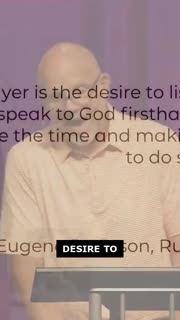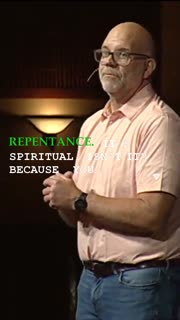Emotional Maturity: Finding Peace at the Cross
Devotional
Sermon Summary
Bible Study Guide
Sermon Clips
1. "Emotions are not bad. God has made us to have emotions, to express emotions. Being emotional over things that should not have said emotions though? Sometimes doesn't lead to the most mature attitude when we go and we hit the world. You see, when you think about your emotions, the same thing goes. Just like going down a bunny slope or going down some blues and some greens or some blacks." [43:35] (28 seconds)
2. "When you think about emotions, the same things go for our emotions. When you say, why in the world would we come on a Sunday morning, and study our emotion. Is this some kind of psychobabble that we're talking about? Well, I will tell you this. I think it's one of the most applicable things that we can actually study is how do we control these said emotions?" [43:35] (60 seconds)
3. "If the church, if you cannot find that way in the church, where can you find it? So James is going to say, what causes fights and quarrels among you? Is it not your passions? They go out of control. That's what they do. In the book, Gospel Shaped Emotions, on page 82, it says this, my emotions often scream louder than my convictions. And they end up getting my way. And that's how it is. It happens so easily. It really does." [52:22] (60 seconds)
4. "Prayer is our desire to listen to God firsthand, to speak to God firsthand, and in setting aside the time, and making the arrangements to do so. If you only see God as a vending machine, if you only see God as the reinforcements, if you only see the one that he's on my side and he's not on your side, you'll treat him as less than who he is. He's the King of kings. He is the Lord of lords. He rules the universe, and he is sovereign and powerful, and we should treat him as such." [59:58] (27 seconds)
5. "Your heart is the control center of your entire life. We wrap our hearts around things. Super easy to wrap your heart around things. Now, remember going about to our emotions. Our emotions sometimes tell us exactly where our heart is. Okay? So today, there is a wonderful volunteer in our kids, Westover Kids Ministry. Don't you love our volunteers and how wonderful they are? And right now, someone somewhere is fighting over a toy in this building." [01:02:08] (37 seconds)
6. "Repentance. It's spiritual, isn't it? Because you have an enemy. Resist the devil, and he will flee. And some of us, through what we say, what we write, even though we think that we're right, sometimes we're more a pawn of him than we are of the king. It should not be. We have a spiritual life. Not only do we have a spiritual life, but we have a behavioral life. It references hands and washing. That we should understand who we are and the behaviors we do, and they will cause us trouble in this life." [01:09:26] (36 seconds)
7. "Humility leads us to serve one another. So maybe there's today you're struggling and maybe you're struggling with some emotions. It's anger, it's grief, whatever it is. We're gonna be looking at those in the next couple of weeks. We'll have some elders to pray with you here in a minute. But humility drives us to serve one another. The sponge becomes the sponge that we wash one another's feet with." [01:10:11] (25 seconds)
8. "I love what Daniel Henderson says about prayer. He says this. In church life, prayer is not the only thing we do. But it must be the first thing we do. It must be our first resolve, not our last resort. The work is to be marked by the unmistakable power of the Holy Spirit. And I think sometimes we don't walk or see the power of the Holy Spirit. I know I don't. It's because I pray with the wrong motives, with the wrong things, because I have the wrong object." [59:08] (26 seconds)
9. "So what do we do? Well, we have our emotions and we're humble about it. And we embrace a humble attitude and reject a lifestyle of pride. Now, we're going to hit this real quick because this is what happens. Watch what he says in verse 6. Here's the reaction that we should have to this. Watch this. He gives more grace. Therefore, it says, God opposes the proud, but he gives grace to the humble." [01:07:28] (28 seconds)
10. "So today, maybe you've never come to church. All right? And you've heard church folks talk about the world all the time. And what does it look like to love the world more than God? Okay, I'm going to show you a demonstration. And I think it's, this is kind of how I think of it. All right? Your heart is the control center of your entire life. We wrap our hearts around things. Super easy to wrap your heart around things." [01:02:08] (31 seconds)
Ask a question about this sermon
2. "When you think about emotions, the same things go for our emotions. When you say, why in the world would we come on a Sunday morning, and study our emotion. Is this some kind of psychobabble that we're talking about? Well, I will tell you this. I think it's one of the most applicable things that we can actually study is how do we control these said emotions?" [43:35] (60 seconds)
3. "If the church, if you cannot find that way in the church, where can you find it? So James is going to say, what causes fights and quarrels among you? Is it not your passions? They go out of control. That's what they do. In the book, Gospel Shaped Emotions, on page 82, it says this, my emotions often scream louder than my convictions. And they end up getting my way. And that's how it is. It happens so easily. It really does." [52:22] (60 seconds)
4. "Prayer is our desire to listen to God firsthand, to speak to God firsthand, and in setting aside the time, and making the arrangements to do so. If you only see God as a vending machine, if you only see God as the reinforcements, if you only see the one that he's on my side and he's not on your side, you'll treat him as less than who he is. He's the King of kings. He is the Lord of lords. He rules the universe, and he is sovereign and powerful, and we should treat him as such." [59:58] (27 seconds)
5. "Your heart is the control center of your entire life. We wrap our hearts around things. Super easy to wrap your heart around things. Now, remember going about to our emotions. Our emotions sometimes tell us exactly where our heart is. Okay? So today, there is a wonderful volunteer in our kids, Westover Kids Ministry. Don't you love our volunteers and how wonderful they are? And right now, someone somewhere is fighting over a toy in this building." [01:02:08] (37 seconds)
6. "Repentance. It's spiritual, isn't it? Because you have an enemy. Resist the devil, and he will flee. And some of us, through what we say, what we write, even though we think that we're right, sometimes we're more a pawn of him than we are of the king. It should not be. We have a spiritual life. Not only do we have a spiritual life, but we have a behavioral life. It references hands and washing. That we should understand who we are and the behaviors we do, and they will cause us trouble in this life." [01:09:26] (36 seconds)
7. "Humility leads us to serve one another. So maybe there's today you're struggling and maybe you're struggling with some emotions. It's anger, it's grief, whatever it is. We're gonna be looking at those in the next couple of weeks. We'll have some elders to pray with you here in a minute. But humility drives us to serve one another. The sponge becomes the sponge that we wash one another's feet with." [01:10:11] (25 seconds)
8. "I love what Daniel Henderson says about prayer. He says this. In church life, prayer is not the only thing we do. But it must be the first thing we do. It must be our first resolve, not our last resort. The work is to be marked by the unmistakable power of the Holy Spirit. And I think sometimes we don't walk or see the power of the Holy Spirit. I know I don't. It's because I pray with the wrong motives, with the wrong things, because I have the wrong object." [59:08] (26 seconds)
9. "So what do we do? Well, we have our emotions and we're humble about it. And we embrace a humble attitude and reject a lifestyle of pride. Now, we're going to hit this real quick because this is what happens. Watch what he says in verse 6. Here's the reaction that we should have to this. Watch this. He gives more grace. Therefore, it says, God opposes the proud, but he gives grace to the humble." [01:07:28] (28 seconds)
10. "So today, maybe you've never come to church. All right? And you've heard church folks talk about the world all the time. And what does it look like to love the world more than God? Okay, I'm going to show you a demonstration. And I think it's, this is kind of how I think of it. All right? Your heart is the control center of your entire life. We wrap our hearts around things. Super easy to wrap your heart around things." [01:02:08] (31 seconds)










